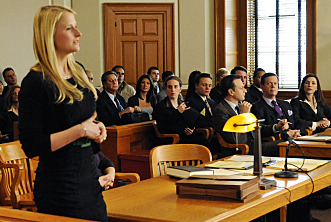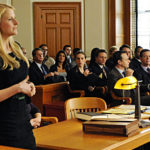Courtroom dramas: perhaps it’s me but the number of episodes dedicated to court cases seem to outnumber the number of actual court cases about ten to one; they are second only to police procedurals (AKA “cop series”) in popularity.
Ignoring classic movies like 12 Angry Men and Witness For The Prosecution, we could start with the likes of Perry Mason, then move on to the likes of the cherished Rumpole of the Bailey, Law & Order, LA Law, Boston Legal, The Practice, Judge John Deed, Silk (which was great), How To Get Away With Murder (which I liked, with provisos), Suits (which I didn’t like), my favourite ever, Murder One and very many more. Then there are the “real life” courtrooms like Crown Court, Judge Judy and Judge Rinder.
Those are just a small selection from the US and UK, quite apart from those from around the world. Let’s face it, people are apparently fascinated with people being tried, and especially the adversarial nature of prosecution and defence plotting against one another to persuade a jury which way to vote. You get the crime, the tense potboiler, the soap opera and occasionally the humour rolled into one – a TV producer’s dream!
I’m two series into The Good Wife, a swish Chicago-based courtroom drama which I had clocked long since but was avoiding in order to avoid more of the same. I mean, there are only so many variables you can wrench from a courtroom scenario, surely? Seems I’m wrong, though creator/writers Robert and Michelle King have done a few chestnuts along the way.
Credit to the Kings, their baby is undeniably well-written, has a fine cast and is more effective than some courtroom dramas of recent years. That said, I do have issues with some of the characterisation, which we will come to in due course. However, the Kings are not above making a few nods here and there to their predecessors, including Murder One, such as the casting of Dylan Baker, here performing brilliantly as Colin Sweeney; Baker got his major break in Murder One. He was a cop there, but here a villainous millionaire akin to the legendary Richard Cross here. What goes around…
Every episode is watchable, and, whisper it, enjoyable. Each has a unique scenario with cunningly concealed points of law and/or evidence to be unfurled at the denouement of each compact 45-minute episode (not even a lengthy title sequence to distract the attention.) And let’s face it, there are lots of them to keep me occupied – 7 series worth on Netflix alone, pus the renamed sequel now featuring on TV (The Good Fight, as it is now known.)
The dynamics come, as indeed they do in all courtroom dramas, from the personalities in the law firm (chambers in the case of British barristers.) In TGW we have a a firm by the name of Stern Lockhart Gardner, whose working partners are the suave liberal Dianne Lockhart (Christine Baranski) and cool but spiky Will Gardner (Josh Charles.)
However, the real star of the SLG show is largely absent in series 1 – but when he does appear, wow! Jonas Stern (Kevin Conway), the diminutive and troubled managing partner, the one with the “lived in” face and “dragged-through-a-hedge-backwards” hair, has not set foot in the firm for a year but boy does he make an impression when he does turn up.
Stern is a force of nature, a one-man whirlwind of charismatic excess, possessed of a gravelly voice THAT MUST BE HEARD at all costs. Before the end of series one he has pulled the rug, and the clients, from under Lockhart and Gardner, and becomes their adversary, almost bankrupting L and G and their outwardly plush firm in the process. Ah, but he’s hiding dementia so watch for more fireworks to come.
Who’s the hero though? Ah, the eponymous good wife is Alicia Florrick (Julianna Margulies), whose husband, former State’s Attorney for Cook County Peter Florrick (Chris Noth), has been dragged through the mud and prison in a scandal from which he hopes yet to clear his name, with help from oily strategist and troubleshooter Eli Gold (Scottish actor Alan Cumming.) It’s certainly not unknown for lawyers to be married to political types – just ask Hillary Clinton – but there’s little doubt that the lawyers, by and large, are painted with the greater ethical purity.
Mrs F, needing to pay the rent, uses her legal training to join SLG as a “junior associate”, despite being rather mature for such her role, were keen and hungry associates are typically mid-20s. She mostly tolerates barbs about her husband but spends her time doing the job and gradually coming out from Peter’s shadow, albeit at the cost of dealing with growing up pains in their teenagers, Zac and Grace. Yes she does have love interest and certainly has doubts about her philandering hubby, while clearly retaining love for him.
However, I do wonder about a series in which the heroine has her eyebrows arched as if in permanent surprise. Maybe she is astonished that some evidence always seems to turn up in the nick of time to allow her to win every case, mostly care of her endlessly resourceful investigator Kalinda Sharma (Archie Punjabi.) That’s a win rate any firm would kill for, even if they have a tendency to take on unprofitable cases based on social conscience, emotion or “on a whim.”
Not like real life, methinks… where are the losing run, the dull cases, the cases without a dramatic twist? Granted her erstwhile fellow associate Cary Agos (Matt Czuchry), loser in the competition for one place at an LB which can ill afford two but a highly talented lawyer nonetheless, jumps ship to work as a prosecutor for evil state’s attorney Glenn Childs (Titus Welliver, one of two opponents to Peter Florrick’s bid to return to office) and provide some real opposition – though it has to be said that the really artful courtroom villainy only starts when Michael J Fox makes his debut in series 2 as Louis Canning. Every hero needs a villain against whom they can truly pit their wits, and the modern trend is to turn friends into adversaries to provide a little sauce and sophistication – a few shades of gray there.
At any rate, Mrs Florrick is waaaaay too accomplished for a junior associate, and to be honest many of the setups are equally more black-and-white. The people are way too beautiful, their suits expensive, their hair perfect, their teeth gleaming white – even the clients and the most lowly witnesses – but then that’s TV culture; the producers would say it’s what audiences want, where I would say authenticity has never been at a higher premium. Hellfire, Barry Scheck even makes a guest appearance as himself!
So it’s juicy fiction based on common and less common scenarios but despite the obvious legal expertise brought in to advise, this is a show primarily designed for its entertainment value, based on larger than life characters: fragile egos, swinging dicks and jobsworths in turn. Do watch – you’ll enjoy.

















